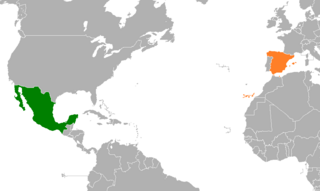Related Research Articles
Montezuma or Moctezuma may refer to:

Mexico–Spain relations are the bilateral relations between Mexico and Spain. Both nations are members of the Organisation for Economic Co-operation and Development, Organization of Ibero-American States and the United Nations.
Julio Rodolfo Moctezuma Cid was a Mexican lawyer who served as the first Secretary of Finance (1976–77) in the cabinet of President José López Portillo, as director-general of Pemex (1981–82) and as director-general of the now extinct Somex bank (1982–88).

Carlos López Moctezuma Pineda was a Mexican film actor. He appeared in more than 210 films between 1938 and 1980. He starred in the film Happiness, which was entered into the 7th Berlin International Film Festival.

Crime and Punishment is a 1951 Mexican film directed by Fernando de Fuentes and starring Roberto Cañedo, Lilia Prado and Carlos López Moctezuma.

The Empty Star is a 1960 Mexican drama film directed by Emilio Gómez Muriel starring María Félix and inspired by the novel of the same name by Luis Spota.

The Mezcala culture is the name given to a Mesoamerican culture that was based in the southern Mexican state of Guerrero, in the upper Balsas River region. The culture is poorly understood but is believed to have developed during the Middle and Late Preclassic periods of Mesoamerican chronology, between 700 and 200 BC. The culture continued into the Classic period when it coexisted with the great metropolis of Teotihuacan.
Elena is a Mexican telenovela produced by Televisa and transmitted by Telesistema Mexicano.
La actriz is a Mexican telenovela produced by Televisa and broadcast by Telesistema Mexicano in 1961.
Amor y orgullo is a Mexican telenovela produced by Ernesto Alonso and transmitted by Telesistema Mexicano.
Canta y no llores... is a 1949 Mexican musical film directed by Alfonso Patiño Gómez and starring ranchera singer Irma Vila and Carlos López Moctezuma.
Champion Without a Crown is a 1946 Mexican sports film directed by Alejandro Galindo and starring David Silva, Amanda del Llano and Carlos López Moctezuma. It is set in the world of boxing.
Immaculate (Spanish:Inmaculada) is a 1950 Mexican drama film directed by Julio Bracho and starring Rosario Granados, Carlos López Moctezuma and Eduardo Noriega.
Angels of the Arrabal is a 1949 Mexican crime film directed by Raúl de Anda and starring Sofía Álvarez, David Silva and Carlos López Moctezuma.
María Montecristo is a 1951 Mexican drama film directed by Luis César Amadori and starring Zully Moreno, Arturo de Córdova and Carlos López Moctezuma.
The Ariel Award for Best Supporting Actor is an award presented by the Academia Mexicana de Artes y Ciencias Cinematográficas (AMACC) in Mexico. It is given in honor of an actor who has delivered an outstanding performance in a supporting role while working within the Mexican film industry. In 1947, the 1st and 2nd Ariel Awards were held, with José Baviera and Fernando Soto winning for the films La Barraca and Campeón Sin Corona, respectively. With the exception of the years 1958 to 1971, when the Ariel Awards were suspended, the award has been given annually. Nominees and winners are determined by a committee formed every year consisting of academy members, previous winners and individuals with at least two Ariel nominations; the committee submit their votes through the official AMACC website.

La mujer de todos is a 1946 Mexican drama film directed by Julio Bracho and starring María Félix, Armando Calvo and Gloria Lynch. It is an adaptation of the 1848 novel The Lady of the Camelias by Alexandre Dumas with the setting moved to Mexico at the beginning of the twentieth century.
Modisto de señoras is a 1969 Mexican sex comedy film directed by René Cardona Jr., and starring Mauricio Garcés, Zulma Faiad, Irma Lozano, Claudia Islas and Patricia Aspíllaga. It is considered perhaps "the most popular and representative" of the series of films that featured Garcés as an upper middle class ladies' man.
Museo del horror is a 1964 Mexican mystery thriller horror black-and-white film directed by Rafael Baledón and starring Julio Alemán, Patricia Conde and Joaquín Cordero.

María Blanca Caridad Ogilvie Clark Peralta, known by her stage name Patricia Morán, was a Mexican actress and socialite. She was the wife of Governor of Chihuahua Oscar Flores Sánchez, who served from 1968 to 1974.